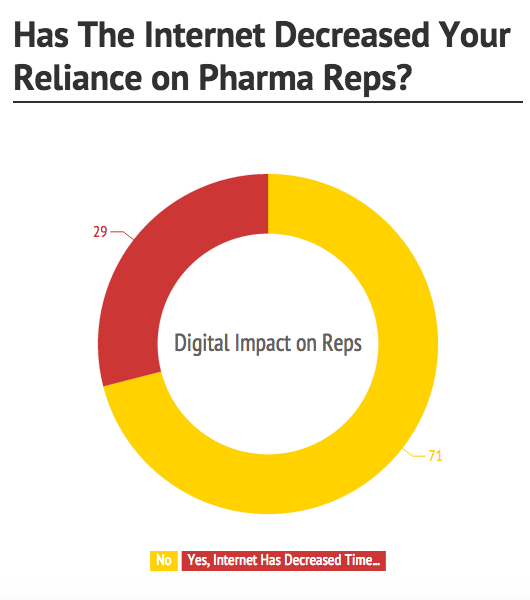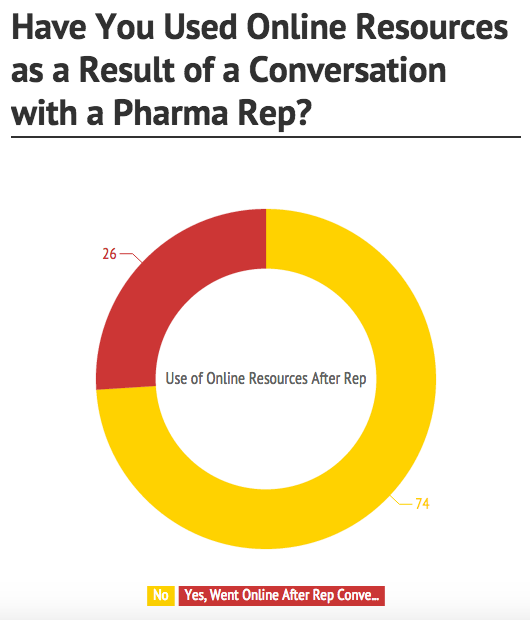Is the growth of digital channels a good thing for reps seeking to engage a physician audience—or is the Internet the driving force behind a trend for more physicians to say “goodbye” to the traditional rep relationship? Looking at recent data from Digital Insights Group (DIG) it seems the answer lies somewhere “in between” for most U.S. physicians today.
As a starting point, let’s look to data from DIG’s Connected Physician (Q3 2014) to size the market of physicians reporting that digital has impacted their relationship with pharmaceutical sales reps. Fully 29% of U.S. physicians agree the Internet has decreased their reliance on pharmaceutical sales reps in Q3 2014. However, 26% of U.S. physicians actually went online after a conversation with a pharmaceutical sales representative in Q3 2014. So we are back to the original question: Is digital a replacement, an adjunct or something in between?
How Digital Affects the Rep Relationship
Among those going online after a rep visit in person, the most likely actions taken is to research a journal article mentioned during the conversation and visiting the site for the brand(s) discussed. In these situations, the investment in digital has been reinforced by the investment in the rep relationship—often allowing the physician to dive deeper into content based on their schedule (and areas of interest).
Among those physicians reporting they have decreased their reliance on sales reps in Q3 2014 as a result of the Internet, we also learn that one in three have actually gone online after a conversation with a sales rep. Even though they are using reps less often overall in 2014—for one-third of this segment the rep visit is actually motivation for them to go online and learn more about the products discussed.
Furthermore, among those physicians reporting they have gone online after a conversation with a sales rep, 35% agree the Internet has decreased their reliance on sales reps in Q3 2014. And while this may seem counterintuitive at first, the reality is that while physicians are actively reducing their reliance on reps overall, a large segment still visits with reps in person for a defined set of personal reasons.
We also know that among those going online after a pharma rep visit, almost half of this segment is currently receiving emails from sales reps—further proof of digital as a complement to the offline relationship. Physicians going online after a meeting with a rep are also twice as likely as the average physician to use electronic detailing in Q3 2014.
Now to the age-old question: Is the age (of the physician) a predictor of digital engagement and channel preference specific to reps? When it comes to going online after a rep visit and seeing reps less as a result of the Internet—the answer is yes. Although the segment going online after a rep visit is somewhat similar to the overall physician population (with a slight bump in the under 45 years old segment), the segment reporting that the Internet has decreased their reliance on reps is significantly younger: Almost half of that segment (29% of all physicians) is under 45 years of age. In other words, while it’s not a given that every young(er) physician prefers digital over a sales rep, if you look at the segment most likely to agree digital is reducing their reliance (and by extension the value they receive from the rep) you find that almost half is under 45 years old! Ultimately, younger physicians training with digital the past decade (or two) are much more likely to continue to migrate towards digital resources over the traditional rep.
So What?
The answer to the ongoing debate of digital versus rep continues within most brands and organizations today. Does digital (or non-personal promotion) complement or replace the rep relationship?
For approximately one in three physicians today the answer is that digital is reducing their reliance on reps in person—albeit not an absolute “no see” situation for most of these physicians. Within that segment it’s clear to see how digital is a replacement or substitution for the role (and value) of the rep in their practice. On the other hand, approximately one-third of physicians report rep conversations are actually motivating online activity—such as journal access and brand site visits. So, this segment clearly prefers for traditional and digital to work together.
The (potentially) confusing insight into these segments is that they are not discreet. Approximately one in three of the physicians reporting their reliance on reps has decreased due to digital say they also go online after meeting with reps in person. The flip side of that is that 35% of those going online after a rep visit report digital is reducing their reliance on the rep—although there is clearly a link and synergy between the two today.
As we ponder what pharma sales and marketing will look like in 2015 (and 2020) there is little doubt that digital will continue to replace various components of what a traditional rep offered in the past (and today). Coupled with decreased access to physicians overall (driven by a number of market forces), it is increasingly clear that brands and organization must understand the complementary nature of digital and the rep for a defined segment of the physician audience. Additionally, companies must also realize how digital has replaced the rep for some physicians—or has replaced a defined portion of what the rep has offered in the past.
Of course, from the customer point of view the ideal scenario is often one that consists of integrated sales, marketing and customer service. The physician may desire a rep for certain situations (launch, samples, new indications, new trials, etc.) and may be fine using digital “self-service” for the majority of his/her engagement with the company or brand in between those defined brand touch points. The key is making sure the two are complementary for those physicians regularly making contact through multiple channels—pure digital, traditional rep and “virtual” rep services.







